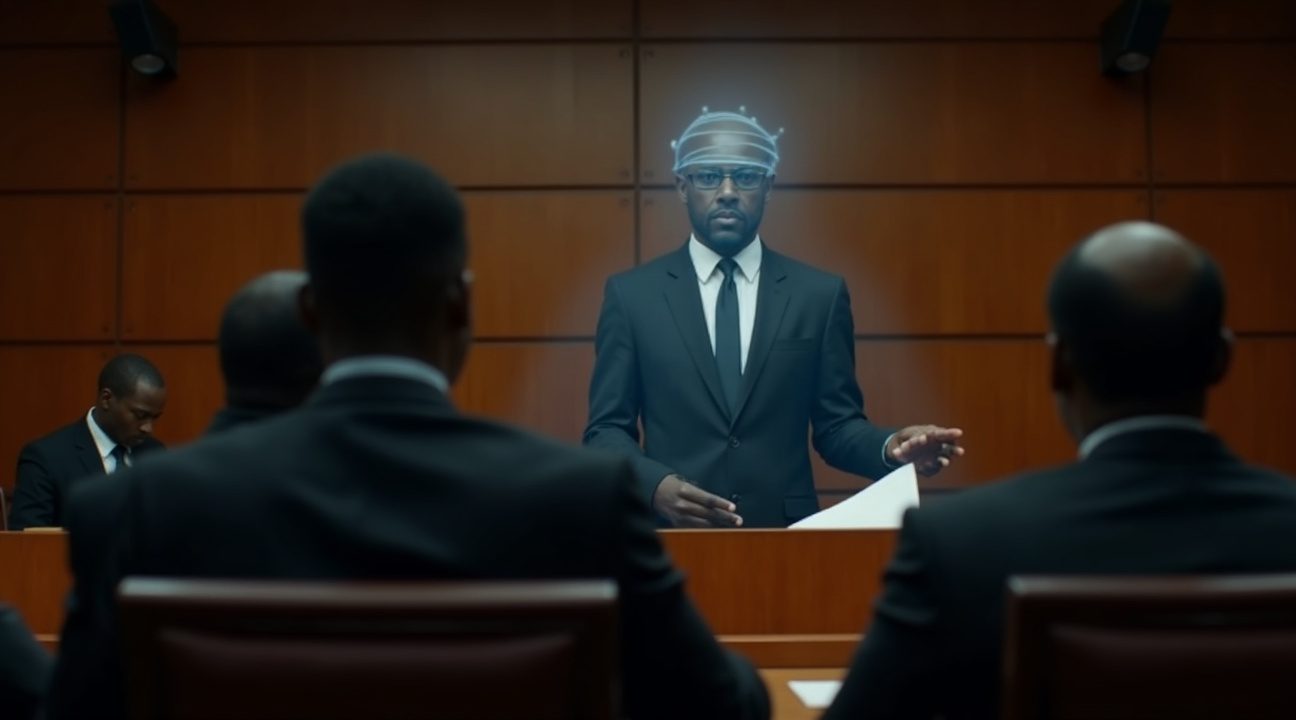Brian Mwenda Njagi, a trained criminologist with no formal legal background, managed to pass himself off as advocate Brian Mwenda Ntwiga, stealing his identity and winning 26 consecutive court cases in Kenya before being discovered in 2023.
Key Takeaways
- Njagi manipulated the Law Society of Kenya’s digital portal on August 5, 2022, changing credentials and uploading his photo to impersonate an actual lawyer.
- Despite zero legal education, he won all 26 cases he appeared for in Nairobi’s courts, showcasing an impressive grasp of legal procedures and advocacy.
- The legitimate lawyer discovered the fraud when he was unable to access his account during his annual practicing certificate renewal in September 2023.
- The scandal revealed a wider systemic problem, uncovering at least five more individuals posing as licensed advocates within the same timeframe.
- Public opinion remains sharply divided; while some admire Njagi’s audacity and competence, legal authorities stress the importance of verified legal training and regulation.
Institutional Breach and Identity Theft
Njagi’s case shines a harsh light on how easily Kenya’s legal identification systems can be compromised. By infiltrating the Law Society of Kenya’s (LSK) database, he gained total control of another professional’s profile. This manipulation included changes to authentication details and uploaded images—giving him full access to courtrooms under a false identity.
Such digital breaches highlight serious flaws in the LSK’s cybersecurity infrastructure. Without multi-layered verification methods like two-factor authentication or biometric checks, professional impersonation becomes dangerously feasible.
Unparalleled Court Success Without Legal Training
Perhaps the most astonishing aspect of Njagi’s story is his unblemished legal record. Appearing before magistrates, High Court justices, and even Court of Appeal judges, he navigated complex cases with precision. Although untrained, he displayed tactical brilliance, winning all 26 cases under false credentials.
This impeccable record challenges long-held beliefs about the necessity of formal legal training. How could an unlicensed individual outperform trained advocates consistently? The answer remains elusive—and troubling.
Flaws in Oversight Mechanisms
The impersonation went unnoticed for over a year. Its discovery was purely incidental—triggered when the real advocate, Brian Mwenda Ntwiga, tried to log in to renew his professional credentials. This suggests that regulatory institutions depend too heavily on annual routines and lack proactive tracking methods.
Investigators believe this may be part of a larger trend. The emergence of other unauthorized practitioners, including those who created fictitious firms, hints at systemic oversight failures rather than isolated breaches.
A Public Debate: Competence Versus Credentials
The unfolding drama sparked intense public discourse. While legal institutions condemned the fraud, others hailed Njagi’s accomplishments. Some Kenyans even called him a folk hero, arguing that ability should trump formal qualifications.
Political leaders seized the moment to criticize perceived elitism in Kenya’s legal industry. They questioned why licensed attorneys couldn’t match Njagi’s courtroom success rate and asked whether current licensing processes truly measure capability.
Legal Community Reaction and Reputation Risk
Professional lawyers warned that the episode could damage public confidence in legal services. If clients feel unsure whether their advocate is legitimate, the entire profession risks losing credibility. The trust that underpins legal services is essential—and exceedingly fragile.
Calls have since emerged within the legal community for stronger vetting processes, layered verification systems, and better coordination between licensing bodies and courts. The scandal may serve as the turning point that forces overdue reform in the profession.
Regulatory Lessons and Global Implications
This case has ripple effects well beyond Kenya. In an era of accelerated digitization, regulatory bodies across professions—from law to medicine—must adapt to counter ever-advancing threats to identity and verification systems.
- Biometric authentication for digital profiles
- Real-time activity monitoring and logging mechanisms
- Mandatory system audits and penetration testing
- Cross-institutional identity verification links between courts and professional organizations
Njagi’s journey, unorthodox though it was, reveals how outdated systems can be gamed by those with enough drive and technical knowledge.
Njagi’s Legal Acumen and Learning Strategy
Despite his background in criminology, Njagi’s legal performances exhibited mastery of courtroom procedure and rhetoric. Was he coached? Did he study independently? Or did he simply rely on pure instinct and extraordinary intelligence? These questions remain unanswered but could reshape thinking on legal education models.
Understanding the methods behind his preparation may help introduce alternate learning pathways, potentially rooted in demonstrated competence rather than strict academic conditioning.
Balancing Justice with Competence Recognition
As Kenya prosecutes Njagi for impersonation and fraud, society faces a critical balancing act. While the law must punish his actions, many contend that recognition of talent should also play some role in shaping his fate—or at least the system’s future structure.
Could this case prompt a reassessment of certification based on skill rather than academic attainment alone? Or would loosening these boundaries invite ethical lapses and exploitation?
Conclusion
The case of Brian Mwenda Njagi unveils deep-rooted flaws in credential verification and challenges the global legal community with uncomfortable truths. It shows how remarkable ability can emerge under illicit circumstances—creating an urgent need for institutions everywhere to reevaluate how they define merit, verify identity, and balance tradition with innovation.
The Criminologist Who Stole a Lawyer’s Identity and Built a Perfect Court Record
Brian Mwenda Njagi pulled off one of the most audacious legal frauds in recent history by stealing another lawyer’s identity and achieving an unprecedented perfect courtroom record. The criminologist, who possessed zero formal legal training, successfully impersonated advocate Brian Mwenda Ntwiga for over a year, winning every single case he handled across multiple court levels in Nairobi.
How the Identity Theft Unfolded
Njagi’s scheme began on August 5, 2022, when the legitimate Brian Mwenda Ntwiga was admitted to the Bar. The imposter gained unauthorized access to the Law Society of Kenya (LSK) portal and identified an account matching his own name. Through criminal manipulation of the system, Njagi tampered with crucial account details, changed the email address to one under his control, and uploaded his own photograph to replace the rightful owner’s credentials.
The real Brian Mwenda Ntwiga remained unaware of this breach until September 2023. When he attempted to log into the LSK system to activate his profile and apply for his practicing certificate, he discovered he could no longer access his account due to the unauthorized email change. This discovery exposed Njagi’s elaborate deception after more than a year of successful impersonation.
I find it remarkable that Njagi managed to fool not only clients but also experienced members of the judiciary. He appeared before Magistrates, High Court judges, and Court of Appeal judges, successfully arguing cases and maintaining his fabricated identity throughout each proceeding. His 26-0 courtroom record demonstrates an extraordinary understanding of legal principles despite lacking formal education in law.
The case raises serious questions about verification processes within Kenya’s legal system. Similar identity breaches in other professional fields have prompted organizations to strengthen their authentication systems. Njagi’s success suggests significant vulnerabilities in the LSK portal’s security measures and highlights the need for more stringent verification protocols.
This unprecedented fraud demonstrates how someone with criminology background knowledge could exploit systemic weaknesses to assume a professional identity. The fact that Njagi won every case he handled while operating under false pretenses makes this story particularly extraordinary in legal history.

How the Fake Lawyer Operation Finally Unraveled
Brian Mwenda Njagi’s elaborate deception came crashing down when the Rapid Action Team of the Nairobi Branch of the Law Society of Kenya arrested him following a surge of public complaints. Citizens had grown suspicious of his activities and reported their concerns to the proper authorities, triggering an investigation that would expose one of the most audacious legal frauds in recent memory.
Official Confirmation of the Fraud
The Law Society of Kenya didn’t mince words when they officially announced their findings on their X account (formerly Twitter). Their statement was crystal clear: “BRIAN MWENDA NJAGI is not an Advocate of the High Court of Kenya, from the Society’s records, neither is he a member of the Branch.” This public declaration ended weeks of speculation and confirmed what investigators had suspected all along.
The announcement sent shockwaves through Kenya’s legal community, where Njagi had operated with apparent confidence for months. Legal professionals who had encountered him in court suddenly realized they’d been interacting with someone who had no formal training whatsoever. His ability to maintain this facade for so long raised serious questions about verification procedures within the system.
The Technical Breach That Exposed Everything
Investigators uncovered a sophisticated scheme involving stolen digital credentials that allowed Njagi to penetrate official systems. He had successfully applied for and paid for a practicing certificate using a compromised account, demonstrating remarkable technical savvy alongside his courtroom performances. However, his application never progressed beyond the initial stages because he couldn’t provide essential documentation.
The missing paperwork included a certificate of business incorporation, among other required documents that legitimate lawyers routinely submit. This gap in documentation should have been a red flag, but the stolen account access had allowed him to bypass initial screening measures. His inability to produce these credentials ultimately became his downfall.
The IT department of the Law Society discovered the security breach on September 28, though the organization didn’t issue their official statement until October 12, 2023. This timeline suggests investigators spent considerable time verifying the extent of the breach and gathering evidence before making their findings public. The delay also allowed them to trace Njagi’s activities and build a comprehensive case against him.
During this investigation period, authorities likely examined each of his 26 court victories to understand how someone without legal training had managed such an impressive winning streak. The technical investigation revealed not just the stolen credentials but also painted a picture of someone who had studied the system extensively enough to exploit its weaknesses.
The case has prompted discussions about cybersecurity measures within Kenya’s legal institutions, much like how Marvel bosses recognize the importance of key elements in their success stories. Legal authorities now face pressure to implement stronger verification protocols to prevent similar breaches in the future.
Njagi’s arrest marked the end of an unprecedented chapter in legal history, but it also highlighted vulnerabilities in professional verification systems that extend far beyond Kenya’s borders. His case serves as a cautionary tale about the importance of maintaining strict oversight in professional licensing, especially in an era where digital credentials can be compromised by determined individuals with sufficient technical knowledge.
Kenya’s Unexpected Hero: How a Fraud Case Divided Public Opinion
The case of Brian Mwenda Njagi exposed deep divisions within Kenyan society, transforming what should have been a straightforward fraud prosecution into a national debate about merit versus formal qualifications. Rather than universal condemnation, Njagi found himself with surprising champions who viewed his story through a different lens entirely.
Francis Atwoli, secretary general of Kenya’s Central Organisation of Trade Unions (COTU), emerged as one of Njagi’s most prominent defenders. Atwoli called for “a fair and transparent examination to test his knowledge, skills, and competencies in the field of law,” positioning the case as an opportunity to recognize informal expertise. His statement reflected a broader frustration with Kenya’s rigid educational system, where brilliant minds often can’t access formal training due to economic barriers.
Political Figures Rally Behind the Imposter
Former Nairobi Governor Mike Sonko threw his weight behind Njagi in characteristically dramatic fashion. Sonko posted videos with the accused lawyer on social media platforms, defending him with the statement: “He’s never killed anyone, he’s not a terrorist.” This defense, while seemingly simplistic, resonated with many Kenyans who felt the legal establishment’s outrage was disproportionate given Njagi’s track record of winning cases for his clients.
The support from these political figures wasn’t merely opportunistic grandstanding. Both Atwoli and Sonko tapped into a genuine sentiment among many Kenyans who saw Njagi’s success as evidence that talent and dedication could triumph over formal credentials. Their backing transformed the narrative from a simple case of fraud to a complex discussion about access to education and professional opportunities in Kenya.
Internet users embraced this alternative narrative with enthusiasm, dubbing Njagi “Kenya’s Mike Ross” in reference to the popular character from the legal drama series “Suits.” Mike Ross practiced law brilliantly despite lacking both a law degree and college education, making him a perfect parallel for Njagi’s situation. This comparison spread rapidly across social media, cementing Njagi’s status as a folk hero in many circles.
The public’s response revealed a stark divide between institutional Kenya and popular opinion. While the Law Society of Kenya and formal legal establishment demanded prosecution, ordinary citizens often expressed admiration for someone who had beaten the system at its own game. Many saw Njagi as representing their own struggles against educational and economic barriers that prevented access to professional careers.
This division highlighted broader issues within Kenya’s legal profession, where expensive education and lengthy training requirements often exclude talented individuals from poor backgrounds. Njagi’s supporters argued that his demonstrated competence in court should matter more than his lack of formal credentials, challenging the profession’s gatekeeping mechanisms.
The case sparked conversations about alternative pathways to professional recognition, with some suggesting that Kenya could benefit from:
- Apprenticeship programs
- Competency-based testing
- Access to mentorship in the legal field
These approaches could allow skilled individuals to practice law without traditional educational requirements. Such discussions gained traction as more details emerged about Njagi’s impressive court performance.
Critics of the legal establishment pointed to instances where formally trained lawyers had performed poorly in court, questioning why educational credentials should matter more than proven results. They argued that Njagi’s 26-case winning streak demonstrated practical legal knowledge that many licensed attorneys couldn’t match.
The unexpected support for Njagi also reflected broader anti-establishment sentiments in Kenya, where many citizens feel disconnected from elite institutions. His story became a symbol of ordinary people succeeding despite systemic obstacles, resonating particularly with young Kenyans who face limited opportunities despite their talents.
https://www.youtube.com/watch?v=mRMjWYJM2_g

The Widespread Fake Lawyer Crisis Exposed by One High-Profile Case
Brian Mwenda’s extraordinary success as an unqualified lawyer has pulled back the curtain on a disturbing trend plaguing Kenya’s legal system. The case prompted Kenya’s Director of Public Prosecutions, Renson Mulele Ingonga, to demand immediate action, calling for “expedited comprehensive investigations” and directing the Inspector General of the National Police Service to conduct a thorough probe. Ingonga’s response wasn’t just about one rogue operator – it revealed a systematic problem that extends far beyond a single individual’s audacious scheme.
Multiple Active Cases Signal Deeper Problems
The investigation uncovered at least five active cases of fake lawyers operating within Kenya’s legal system, demonstrating that Mwenda wasn’t an isolated incident. These cases include:
- Jinta W. Karoki, who claims to operate Gura Advocates
- Peter Kugo, who presents himself as a lawyer at Kenneth Kagu Gishi Advocates
- Faith Ivon Shakila, who has been caught impersonating Miriam Biko, a legitimate Judiciary researcher
- Bonifus Mor Kirani, operating under the alias “Mr. Monik” and claiming to run an entire advocates company
Each case represents a breach of public trust that undermines the integrity of Kenya’s judicial system.
The scope of this crisis has forced authorities to acknowledge what Ingonga described as “increased cases of unqualified persons… pretending to be Advocates of the High Court of Kenya.” These revelations suggest that inadequate verification systems and security protocols have created an environment where ambitious individuals can exploit legal loopholes. Much like how creative storytelling can captivate audiences, these fake lawyers have crafted convincing personas that fooled clients, courts, and even experienced legal professionals.
Institutional Response and Reform Measures
The Law Society of Kenya has committed to updating security protocols for its online portal, acknowledging that current systems failed to prevent these breaches. Officials have also called for a comprehensive review of all 26 cases that Mwenda won, raising questions about the validity of legal outcomes achieved through fraudulent representation. This review process will likely set precedent for handling similar cases discovered in the future.
The institutional response reflects a recognition that addressing this crisis requires both immediate fixes and long-term systemic changes. Verification processes, background checks, and digital security measures must evolve to prevent future incidents. The case has exposed vulnerabilities that existed within established legal frameworks, forcing a complete reassessment of how the legal profession monitors and validates its members.
From Courtroom to Cinema: How the Story Captured Kenya’s Imagination
The extraordinary case of Brian Mwenda Njagi quickly evolved from a legal scandal into a cultural phenomenon that captivated Kenya and attracted international attention. His audacious scheme to practice law without credentials didn’t just shock the legal community—it sparked a nationwide conversation that transcended typical fraud reporting.
Media Frenzy and Documentary Development
The story’s compelling narrative caught the attention of documentary filmmakers who recognized its potential for screen adaptation. An upcoming production aims to retell this remarkable tale, combining elements that make for captivating cinema: real-world legal drama, fraud investigation, and sharp social commentary on professional credentials.
International media outlets couldn’t resist covering this unique story. NDTV, BBC, Straits Times, and NTV Kenya all featured extensive coverage of Njagi’s case, each highlighting different aspects of his remarkable deception. The story’s appeal lay not just in its audacity but in the questions it raised about professional competence and the value of formal education.
Cultural Impact and Social Commentary
Social media platforms exploded with viral responses as Kenyans debated the implications of Njagi’s success in court. The case became a cultural touchstone that generated significant commentary about several key issues:
- The role of meritocracy versus formal credentials in professional settings
- Questions about whether practical skills can outweigh academic qualifications
- The effectiveness of current legal education and certification systems
- Broader discussions about professional competence in Kenya’s legal system
The story resonated deeply because it challenged conventional assumptions about expertise and qualifications. Many found themselves asking uncomfortable questions: if an untrained individual could win 26 cases, what did this say about the legal profession itself? This cultural moment reflected broader tensions about access to professional careers and the gatekeeping function of formal education.
The case’s transformation into entertainment content demonstrates how certain stories capture public imagination by touching on universal themes. Njagi’s tale combined the appeal of an underdog story with serious questions about professional standards, creating a narrative that demanded both entertainment and examination. The upcoming documentary promises to explore these complex layers while chronicling one of the most unusual legal deceptions in recent history.

System Vulnerabilities That Made the Impossible Possible
Exploiting Dormant Professional Accounts
The Brian Mwenda case exposed critical weaknesses in Kenya’s professional registry infrastructure that criminals can exploit with surprising ease. His sophisticated fraud technique centered on targeting dormant accounts belonging to legitimate lawyers who hadn’t activated their credentials. The real lawyer whose identity he assumed worked at the Office of the Attorney General but had never applied for a practicing certificate, leaving their portal account essentially inactive.
This dormancy created the perfect vulnerability. When legitimate account holders don’t regularly monitor or use their professional registry access, unauthorized users can slip through security gaps undetected. The original account holder’s minimal portal activity meant there were fewer digital footprints to trigger security alerts or raise suspicions about unusual account behavior.
Systemic Security Gaps in Professional Registration
The Law Society of Kenya’s system inadvertently created both a vulnerability and a safeguard that shaped this fraud’s trajectory. While the requirement for additional documentation prevented Mwenda from obtaining full fraudulent certification, the gaps in LSK’s security protocols allowed his operation to continue for over a year. This dual nature of the system highlights how incomplete security measures can simultaneously limit and enable criminal activity.
What makes this case particularly alarming is its scale beyond just one individual. At least five other people were simultaneously operating as fraudulent advocates across the country, suggesting that Mwenda’s success wasn’t an isolated incident. This pattern indicates that the vulnerabilities he exploited weren’t unique to his specific case but represented fundamental weaknesses in the country’s legal registry infrastructure.
The sophistication required to access and manipulate these database entry points demonstrates that professional registry systems face threats from individuals with significant technical knowledge. These criminals understand how to identify and exploit the precise moments when legitimate users are absent from their accounts, turning professional credentials into tools for deception.
The fact that these fraudulent operations could run concurrently across multiple accounts suggests that monitoring systems weren’t robust enough to detect patterns of suspicious activity. Each successful case likely emboldened other potential fraudsters, creating a cascading effect that threatened the entire legal profession’s credibility. The registry system’s inability to flag these coordinated attacks reveals how professional oversight bodies must strengthen their cybersecurity measures to protect both legitimate practitioners and the public they serve.
Sources:
NDTV – Kenya Officials Arrest Fake Lawyer Who Won 26 Court Cases
Straits Times – Kenya’s ‘Mike Ross’: Fake Lawyer Who Won All His Cases Becomes Wanted Man
Instagram – (Post by Mike Sonko)
YouTube – (Video featuring Brian Mwenda Njagi)
YNews Digital – Brian Mwenda: Kenya’s Fake Lawyer Story Heads to the Big Screen in Upcoming Documentary


